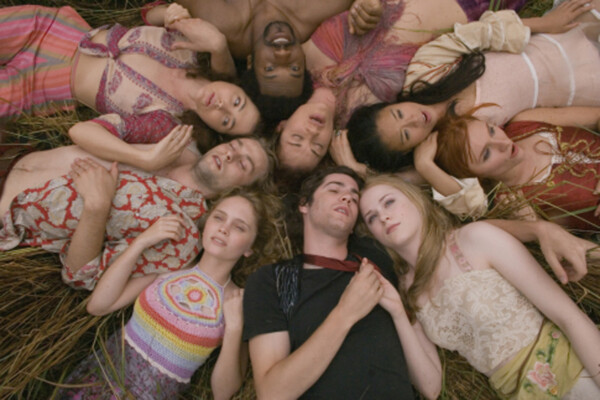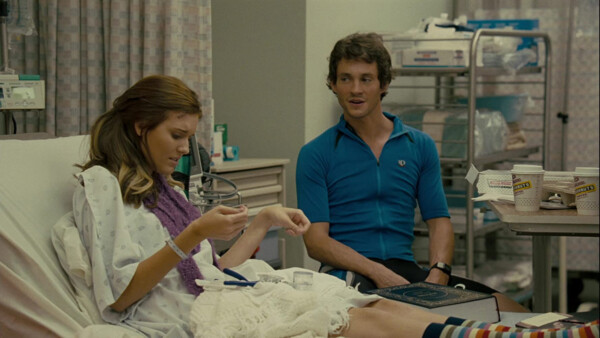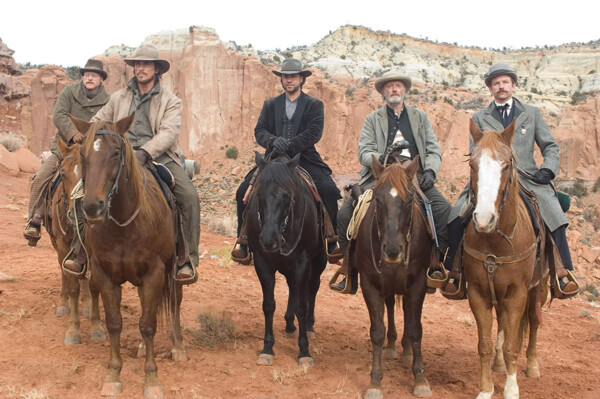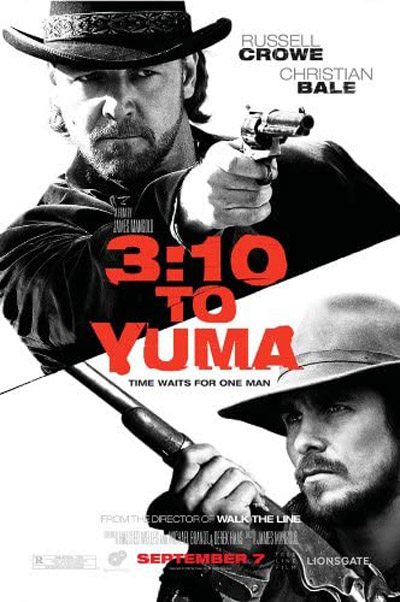Del and Mladen review ‘Across the Universe’

(Clockwise from top) Martin Luther McCoy as Jo-Jo, Dana Fuchs as Sadie, T.V. Carpio as Prudence, Ekaterina Sknavina as Rita, Evan Rachel Wood as Lucy, Jim Sturgess as Jude, Kiva Dawson as MaxÕs Girl, Joe Anderson as Max, and Halley Wegryn Gross as Max's Girl in Revolution Studios' "Across the Universe." Photo Credit: Abbot Genser SONY PICTURES ENTERTAINMENT INC.
“Across the Universe” Starring Evan Rachel Wood, Jim Sturgess, Joe Anderson, Dana Fuchs, Martin Luther, and T.V. Carpio. Directed by Julie Taymor. Rated PG-13. 131 minutes.
Del’s take
About 15 minutes into “Across the Universe” I decided a review massacre was in order. By movie’s end, however, I had changed my mind. The movie didn’t work for me and I wanted to know why.
I thought about it all night. I used up precious REM sleep grinding my teeth on the issue. And sometime between bedrise and showertime I hit upon the answer:
Its moment had passed.
But not for the reasons you think.
“Across the Universe” is a homage to The Beatles, the ’60s, Vietnam War protests and the civil rights movement. It features Jude, a mop-topped lad from Liverpool who comes to America to find his father, who abandoned his mother in the Old Sod after World War II. Jude meets Max and falls in love with Max’s sister, Lucy. This unlikely trio hooks up with a New York crowd of artists and protesters who experiment with LSD, reinvent music and get clubbed in the head by truncheon-wielding cops.
The characters have an annoying habit of lapsing into song at almost every turn – re-mastered Beatles tunes as it were. The ratio of singing to storytelling is about 10 to 1. Unless you’re a huge fan of the Fab Four you’ll catch yourself rolling your eyes as Jude, frustrated by Lucy’s evolving radicalization by the anti-war movement, manifests his angst through a singing and strawberry-flinging hissy fit.
But the problem with “Across the Universe” is that it no longer works. The Beatles’ were replaced by new wave, grunge, hip-hop and emo. The “turn on, tune in, drop out” moment doesn’t exist. We have another Vietnam raging in the Middle East, and the civil rights movement has become a pale shadow of its former self.
More significantly, young people no longer feel the passion that once energized those social changes.
Back in the 1980s the kids were known as the “Me Generation.” But self-absorption on a cultural scale didn’t exist until the 2000s, when the gadget-pampered, media-beatified children of the ’80s and ’90s came of age.
The young people of the ’60s did what they did, no matter how wrong or stupid, because they were charged with a passion for revolution. At least some of them believed they could change the world.
But that passion is gone. Instead, we have a pretense of passion whose underlying motivation is self-aggrandizement, and it just rings hollow. People don’t march through the streets to bring change; they march through the streets to get on TV.
That’s why “Across the Universe” didn’t work for me. It was like watching Howdy Doody shout, “Hell no, we won’t go!”
When I see mobs of long-haired, placard-carrying hippies surrounding the White House and demanding that Bush pull out of Iraq, I’ll change my mind about “Across the Universe.”
Until then, I give it 10 big yawns.

Mladen’s take
A movie’s place in time shouldn’t influence its entertainment value.
“Across the Universe” is set in the turbulently kitschy 1960s but that doesn’t mean the movie needed to suck in the attention-deficit-disorder 2000s.
“Across the Universe” would have been crap in 1965, too.
Sweeping aside Del’s huffing and puffing about our selfish, publicity-seeking youth by noting that’s what all youth everywhere are at any given moment, leaves only the prospect of reviewing “Across the Universe” on its own merit.
The movie is little more than a montage of The Beatles songs. It would have been tolerable if more nudity and violence were offered, but that’s only two of several mistakes.
The creators of “Across the Universe” took Fab Four tunes and built a movie around them.
What they should have done was write a coherent script and cherry-picked The Beatles songs that fit. The result could have been both a good movie and a celebration of the Fab Four.
That said, I should come clean with a couple of prejudices.
First, the only thing good about The Beatles was Paul McCartney and that’s only after he founded Wings. “Live and Let Die” is one of the greatest songs ever.
And, second, “Across the Universe” fails to use The Beatles most whimsical and charming song, “Yellow Submarine.”
How can you produce, direct or act in a movie featuring The Beatles songs without using “Yellow Submarine?”
“Across the Universe,” in part, uses Vietnam War-era unrest in the United States as a component of its shtick.
“Yellow Submarine” could have been the song that gaps the inane decisions made by politicians back then with the gallingly obtuse decisions made, and being made, by the Bush administration today.
That would have had two effects.
First, Del might have been less grumpy in his review of “Across the Universe” because it had a link to the present.
And, second, the movie would have helped me survive the next 10 months of Bush.
After all, couldn’t we all “sail on to the sun until we found a sea of green and (live) beneath the waves in our yellow submarine” prosperously in international waters until Jan. 21, 2009?
Mladen Rudman is a former journalist and technical editor. Del Stone Jr. is a former journalist and author.
Video

“The Jane Austen Book Club” Starring Maria Bello, Emily Blunt, Kathy Baker, Amy Brenneman, Maggie Grace, Jimmy Smits, Hugh Dancy. Directed by Robin Swicord. 106 interminable minutes. Rated PG-13.
Del’s take
When I suggested to Mladen we review something other than science fiction or horror I had no idea he’d go soft and squishy. But after consulting some of the ladies in our presence he came up with “The Jane Austen Book Club” which set my skin to crawling.
The words “Jane Austen” conjure an image of a spinster snuggled on the couch with her embroidery and her kitty cat, listening to classical music and fondly remembering the one and only night of her life that a beautiful man French-kissed her.
“The Jane Austen Book Club” stars the entire female population of Planet Amazonia, and Hugh Dancy. It is about a group of demasculating, wine-guzzling, teenage boy-seducing harpies who plot to subjugate the men in their lives by proposing an ultimatum: Read Jane Austen … OR ELSE. At least that’s what I got out of it.
Incredibly, the men cave to this ridiculous coercion and the movie wraps with a stomach-turning group cootie exchange.
Did I just give away the ending? Oh hell, I don’t care.
I find myself irritated by movies like “The Jane Austen Book Club.” The characters live in the most expensive state in the nation, wear stylish clothes, drive $40,000 Volvos, own mansions, don’t appear to ever work for a living … and wring their hands because hubby would rather watch a basketball game than rhapsodize about some lame English romance writer who died almost 200 years ago.
Gimme a break.
After watching “The Jane Austen Book Club” I felt the need to cleanse my palate with something more uplifting, like “Reservoir Dogs.”
Guys, do the words “chick flick” mean anything to you?
Stay away. Stay far, far away.
Ten million yawns.

Mladen’s take
I watched “The Jane Austen Book Club” on a Sunday night and the following day took a shower using French vanilla and cinnamon toast-scented shampoo.
I’m surprised Del, who’s far more cosmopolitan than me, didn’t react the same way.
The movie is a delicate, often charming, introspective about a group of people coping with maturing lives.
It was refreshing to learn that regular folks in Jane Austen’s time — she died in 1817 — also had to deal with the complexities of lovers found and lost and friends found and lost. Just knowing others across centuries have experienced what I have experienced is comforting.
The movie made me a more complete man.
OK, I’m lying.
“The Jane Austen Book Club” is a standard, putrid take on comfortable middle class people looking for purpose.
They use each other, commit adultery, make poor choices and, in the end, it all seems appropriate and normal and good and healthy. In short, it’s like the reading club members are running for president.
But, more than anything, what good is a movie that doesn’t need 7.1-channel, 75-watt per channel, DTS Neo:6 Cinema-filtered sound amplification to help get its message across?
None.
“The Jane Austen Book Club” has a running time of about 1 hour, 46 minutes and that means it was about 1 hour and 45 minutes too long.
Mladen Rudman is a former journalist and technical editor. Del Stone Jr. is a journalist and author.

“3:10 to Yuma” Starring Russell Crowe, Christian Bale, Peter Fonda. Directed by James Mangold. 122 minutes. Rated R.
Mladen’s take
The good guy died and I didn’t care.
The bad guy lived and I didn’t care.
There wasn’t much to care about “3:10 to Yuma,” a cowboy movie bullet-holed with silliness.
The plot: A hapless rancher somewhere in Arizona stumbles into becoming part of a posse delivering a murderous, Bible-quoting outlaw to a train depot. There, the bad guy is supposed to be put on the “3:10 to Yuma” for delivery to a federal prison.
Almost from the get-go, the well-received (for reasons beyond me) movie starts to smell like a roadkill mule basking in the desert sun for two weeks.
For starters, the posse planned its escort of the intelligent killer much like the Bush administration planned for the Iraq invasion.
No kidding, there must have been at least a half-dozen opportunities for bad man Ben Wade, portrayed by Russell Crowe, to escape or just plain old stab, strangle, blow up or shoot all the men taking him to the train. He only kills a couple and that was because one took his horse and the other insulted his mother.
Wade faced a hangman’s noose but acted like he was taking a horseback tour of a playland inhabited by greedy railroad barons and bloodthirsty Apaches.
Oh, he’d mutter something now and then about his gang coming to save him but I kept asking, why?
My children’s guinea pigs could have saved themselves from the posse guarding Wade without intervention from our backyard squirrels, so why did the mastermind behind dozens of stagecoach robberies need his band of baddies to rescue him?
Throw in standard Hollywood fare such as really good looking women always being attracted to murderers, as well as absurdness like a father’s need to impress his son by dying and the movie almost cascades into farce.
By the way, the 3:10 train to Yuma is about five minutes late, so the director could squeeze more loony violence into the film.
Dang and dadgum, the movie was rotten as a polecat in heat.
The DVD box claimed “3:10 to Yuma” was the best Western since “Unforgiven.” All that must mean is that no one had made a cowboy movie since Clint Eastwood’s bone fide award-winner in 1992.

Del’s take
The way I see it there are five basic movie western plots:
1. Ex-gunslinger forced to strap on his six-shooter.
2. Mysterious stranger rides into town, agitates locals.
3. Ornery land baron steals water/land/cattle/women, must be made to pay.
4. Cowpokes drive cattle through injun territory and bond.
5. Sheriff jails bad man; bad man’s gang lays siege to jail.
Fortunately, “3:10 to Yuma” does not embrace any one of these hackneyed plots. Unfortunately, it embraces ALL of them in a Frankensteined pastiche of cliches, revisionism and logic flaws that left me wondering if Hollywood will ever again tell a decent story.
In “Yuma” we have English actor Christian Bale tasked with bringing Australian actor Russell Crowe to Yuma, where he will board a train and be taken to jail. What’s the matter, Hollywood? Couldn’t find an American actor?
Bale is a milquetoast kinda guy disliked by his bloodthirsty 14-year-old son, who wishes Dad would grow a pair and blast the bad guys to smithereens. Crowe is a hard-drinkin’, stagecoach-robbin’, murderin’ varmint who somehow gets caught and shipped off to Yuma in a long and perilous journey fraught with escape opportunities and conniving Native Americans. Close behind is Crowe’s gang, led by his eerily amoral No. 2 who bears an uncanny resemblance to every James Bond bad guy’s triggerman.
Let’s do a cliché check:
No. 1 – check. Bale is a former soldier who wants to spend his golden years cowpoking. No. 2 – check. Crowe is the menacing bad guy who rides into town, runs everyone out of the saloon, corners the local hooker … you get the picture. No. 3 – check. Bale is just a poor rancher who needs money or his ranch will go under. No. 4 – check. We get lots of philosophizing and empathizing on the hegira to Yuma. No. 5 – check. Two sieges – count ’em – TWO!
The movie ends with a totally unbelievable moment of moral clarity that could only have been dreamed up by a scriptwriter who wears peach-colored Polos to yoga practice.
This stinker was more aggravating than entertaining. I give it 10 yawns.
Mladen Rudman is a former journalist and technical editor. Del Stone Jr. is a journalist and author.
Video